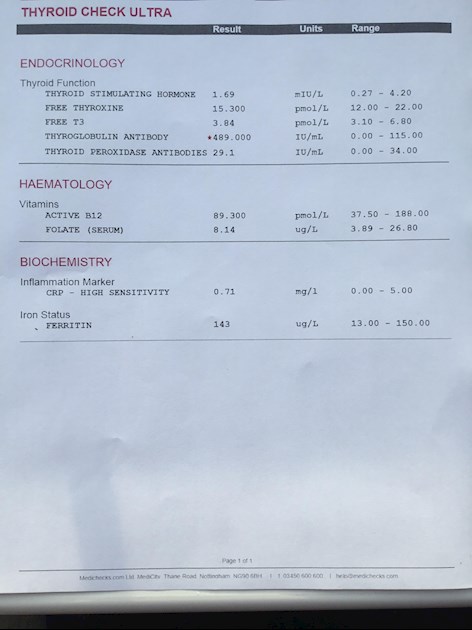Vitamin D 91.3 nmol/L Antibody 489.00 IU/mL (0.00 - 115.00)
Thanks
Peter

Vitamin D 91.3 nmol/L Antibody 489.00 IU/mL (0.00 - 115.00)
Thanks
Peter
flfair
Did your wife get the increase in Levo suggested in reply to your post of a month ago? If so, how long had she been on the new dose before this test was done? If you can answer those questions then comment can be made on her TSH, FT4 and FT3 results.
TPO antibodies close to top of range and TG antibodies over range suggest autoimmune thyroid disease aka Hashimoto's which is the most common reason for hypothyroidism.
Most doctors dismiss antibodies as being of no importance and know little or nothing about Hashi's and how it affects the patient, test results and symptoms. You need to read, learn, understand and help yourself where Hashi's is concerned.
She can possibly help reduce the antibodies by adopting a strict gluten free diet which has helped many members here. Gluten contains gliadin (a protein) which is thought to trigger autoimmune attacks so eliminating gluten can help reduce these attacks. You don't need to be gluten sensitive or have Coeliac disease for a gluten free diet to help.
Gluten/thyroid connection: chriskresser.com/the-gluten...
stopthethyroidmadness.com/h...
stopthethyroidmadness.com/h...
hypothyroidmom.com/hashimot...
thyroiduk.org.uk/tuk/about_...
Supplementing with selenium l-selenomethionine 200mcg daily can also help reduce the antibodies, as can keeping TSH suppressed.
Folate is on the low side, it should be at least half way through range (15.5+ with that range). Folate rich food and a good B Complex containing methylfolate (not folic acid) can help.
Active B12 isn't too bad but she might benefit from it being a bit higher. There is methylcobalamin (B12) contained in a good B Complex and that may help increase her level. Look at Igennus Super B (900mcg methylcobalamin at suggested dose of 2 tablets daily) and Thorne Basic B (400mcg methylcobalamin at suggested dose of 1 capsule daily).
Vit D isn't bad but a little short of that recommended by the Vit D Council (125nmol/L) and the Vit D Society (100-150nmol/L). Any Vit D supplemented should be accompanied by it's important cofactors magnesium and Vit K2-MK7. Magnesium helps D3 to work. We need Magnesium so that the body utilises D3, it's required to convert Vit D into it's active form. So it's important we ensure we take magnesium when supplementing with D3.
Magnesium comes in different forms, check to see which would suit you best and as it's calming it's best taken in the evening, four hours away from thyroid meds if taking tablets/capsules, no necessity if using topical forms of magnesium.
naturalnews.com/046401_magn...
Check out the other cofactors too (some of which can be obtained from food).
Ferritin is near the top of the range, certainly doesn't need to go any higher. If she is supplementing she should reduce the dose.
SeasideSusie
No, she is terrified of going to the doctors about anything, she takes plenty of magnesium using doctors best and magnesium flakes in the bath and mag oil, she used to take Hebridean kelp, but stopped taking it, just started taking super B complex, will look into others.
Many thanks
Peter.